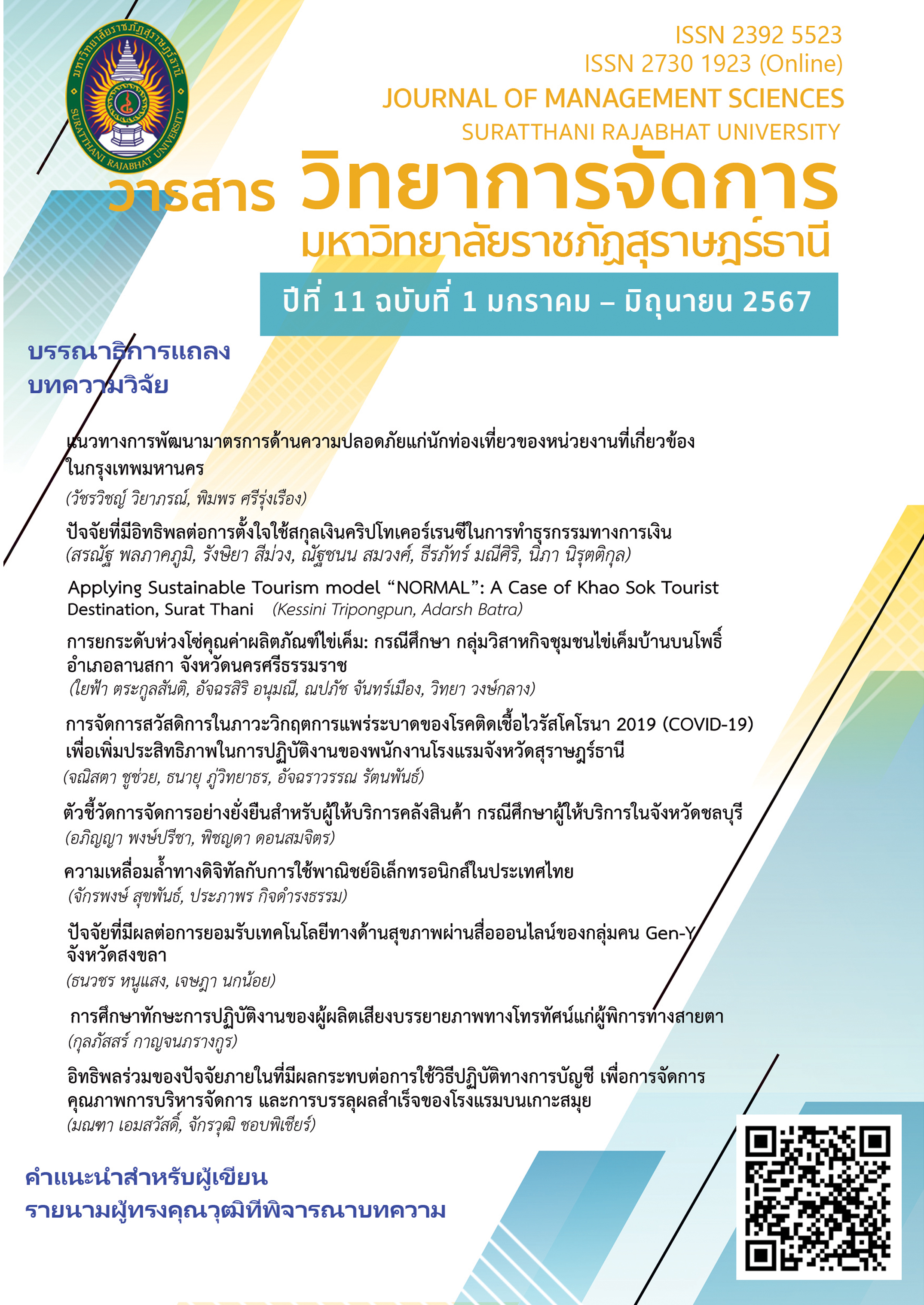ปัจจัยที่มีผลต่อการยอมรับเทคโนโลยีทางด้านสุขภาพผ่านสื่อออนไลน์ของกลุ่มคน Gen-Y จังหวัดสงขลา
Main Article Content
บทคัดย่อ
การวิจัยนี้มีวัตถุประสงค์เพื่อ 1) ศึกษาระดับทัศนคติทางด้านสุขภาพ 2) ศึกษาระดับการรับรู้ความเสี่ยงทางด้านสุขภาพ 3) ศึกษาระดับปัจจัยส่วนประสมทางการตลาดออนไลน์ 4) ศึกษาระดับการยอมรับการใช้เทคโนโลยีทางด้านสุขภาพ 5) ศึกษาทัศนคติทางด้านสุขภาพ การรับรู้ความเสี่ยงทางด้านสุขภาพ และปัจจัยส่วนประสมทางการตลาดออนไลน์ที่มีผลต่อการยอมรับการใช้เทคโนโลยีทางด้านสุขภาพผ่านสื่อออนไลน์ของกลุ่มคน Gen-Y จังหวัดสงขลา กลุ่มตัวอย่างเป็นกลุ่มคน Gen-Y จำนวน 400 คน เก็บรวบรวมข้อมูลโดยใช้แบบสอบถามออนไลน์ สถิติที่ใช้ในการวิเคราะห์ข้อมูล คือ ค่าความถี่ ค่าร้อยละ ค่าเฉลี่ย ส่วนเบี่ยงเบนมาตรฐาน และการวิเคราะห์การถดถอยเชิงพหุ ผลจากการวิจัย พบว่า กลุ่มตัวอย่างส่วนใหญ่เป็นเพศหญิง มีอายุระหว่าง 24-29 ปี ระดับการศึกษาปริญญาตรี ประกอบอาชีพพนักงานเอกชน พนักงานบริษัท รายได้ต่อเดือนอยู่ที่ 10,001-15,000 บาท ใช้โทรศัพท์มือถือสมาร์ทโฟนในการเข้าถึงสื่อออนไลน์ ช่วงเวลา 18.01-21.00 น. โดยมีระดับทัศนคติทางด้านสุขภาพอยู่ในระดับมากที่สุดคิดเป็นค่าเฉลี่ย 4.30 ระดับการรับรู้ความเสี่ยงอยู่ในระดับมาก ค่าเฉลี่ย 4.04 ระดับปัจจัยส่วนประสมทางการตลาดออนไลน์ อยู่ในระดับมาก ค่าเฉลี่ย 4.22 ระดับการยอมรับการใช้เทคโนโลยีทางด้านสุขภาพมากที่สุด ค่าเฉลี่ย 4.29 และปัจจัยที่มีผลต่อการยอมรับเทคโนโลยีทางด้านสุขภาพผ่านสื่อออนไลน์ ได้แก่ 1) ด้านการให้บริการส่วนบุคคล 2) ด้านราคา 3) ด้านช่องทางการจัดจำหน่าย 4) ด้านการส่งเสริมการตลาด และ 5) ด้านความเข้าใจ ทั้งนี้ ปัจจัยทัศนคติทางด้านสุขภาพการรับรู้ความเสี่ยงทางด้านสุขภาพ และปัจจัยส่วนประสมทางการตลาดออนไลน์มีผลต่อการยอมรับเทคโนโลยีทางด้านสุขภาพผ่านสื่อออนไลน์ อย่างมีนัยสำคัญทางสถิติที่ระดับ 0.05 ซึ่งสามารถนำผลการศึกษาที่ได้รับมาปรับปรุง พัฒนา ต่อยอดเป็นนวัตกรรมเกี่ยวกับสุขภาพผ่านสื่อออนไลน์ต่อไปในอนาคต
Article Details

อนุญาตภายใต้เงื่อนไข Creative Commons Attribution-NonCommercial-NoDerivatives 4.0 International License.
เอกสารอ้างอิง
Choketaworn, L. & Donkwa, K. (2017). Impacts of marketing mix and attitude toward clean food purchased decision of consumers in Nakhon Ratchasima Province. KKU Research Journal (Graduate Studies) Humanities and Social Sciences, 5(1), 79–91.
Churchill, E. F. (2012). Social media meaning. Proceeding of the 2012, international on Socially-aware multimedia. http://dl.acm.org/citation.cfm?id=2390876
Cronbach, L. J. (1970). Essentials of psychological test (5th ed.). Harper Collins.
Dachjiramanee, C. Suwannoi, T., Sukhaparamate, S. Jantarakolica, K. & Jantarakolica, T.(2022). Factors affecting the acceptance of Internet of Things (IoT) technology for residence. Journal of Humanities and Social Sciences Nakhon Phanom University, 12(3). 271-286.
Davis, F.D. (1989). Technology acceptance model, Technology acceptance model - IS Theory. http://is.theorizeit.org/wiki/Technology_acceptance_model
Electronic Transactions Development Agency. (2018). Checklist to know about online trading. Electronic Transactions Development Agency.
Euajarusphan, A. (2018). Media usage behavior by generation X and generation Y. The Journal of Social Communication Innovation, 6(1), 59-65.
Galib, H.M. & Steiger J. (2018). Predicting consumer behavior: An extension of technology acceptance model. International Journal of Marketing Studies, Canadian Center of Science and Education, 10(3), 1-73.
Jaiwong, S., Sartmoo, S., Worasesthaphong, T., & Kanittinsuttitong, N. (2022). Factors affecting technology acceptance and purchase decision on youtuber device through the platform. Narkbhutparitat Journal Nakhon Si Thammarat Rajabhat University, 14(3), 206-219.
Kacha, R. (2010). Lifestyle of subculture groups in Generation Y [Master’s thesis, Chulalongkorn University] http://cuir.car.chula.ac.th/handle/123456789/27315
Kamal, S.A., Shafiq, M. & Kakria P. (2020). Investigating acceptance of telemedicine services through an extended technology acceptance model (TAM). Technology in Society, 60. DOI: 10.1016/j.techsoc.2019.101212
Kamonsupajinda, K. (2015). Social media use and generational identity: The differentiation between baby boomers generation vs. y generation [Unpublished master’s thesis]. Bangkok University.
Kanchanapha, C., & Phungbangkruay, J. (2020). The factors influencing clean food purchase intentions of generation Y in Bangkok. KKBS Journal of Business Administration and Accountancy, 4(2), 37–62.
Khangket, A. (2010). E-Commerce 6P marketing mix. http://drsuntzuweekly.com/it/-e-commerce-6p.
Leonwan, O. (2012). Factors affecting information technology acceptance: A case study of community development department, government complex chaeng watthana [Unpublished master’s thesis]. Rajamangala University of Technology Thanyaburi.
Liman, Q. & Sunalai, S. (2021). Factors affecting technology acceptance for mobile payment application of consumers in Bangkok. Suthiparithat Journal, 35(1), 158-174.
McKechnie, S., Winklhofer, H. & Ennew, C. (2006). Applying the technology acceptance model to the online retailing of financial services. International Journal of Retail & Distribution Management, 34(4), 388-410.
Miller, R.K. & Washington, K.D. (2017). Consumer behavior 2017-2018. Loganville, GA: Richard K Miller & Associates.
Panya, A. (2019). Online marketing mix factors affecting the decision to buy fashion clothes via social media (Facebook) of undergraduate students in the university district, Mueang District Chiang Mai Province [Unpublished master’s thesis]. Chiang Mai Rajabhat University.
Pengjarern, S. (2018). Factors affecting attitude on using social network of senior students at Kasetsart, Bangkhen Unversity. Vajira Nursing Journal, 18(2), 63–74.
Pisanpanich, C. (2011). The influence of materialism and self-awareness on impulsive buying behavior among Generation Y consumers [Unpublished master’s thesis]. Chulalongkorn University.
Pongput, S. (2013). Social Media: Applied Guidelines. http://library.senate.go.th/document/Ext6685/ 6685991_0004.PDF.
Poothong, T. (2018). Influence of personality and technology acceptance on intention to use e-books. Veridian E-Journal, 11(2), 3179-3193.
Prasitdechsakul, P. (2012). Transforming business after the COVID-19 crisis, KMA-Krungsri Mobile app. Bank of Ayudhya Public Company Limited.
Schiftman, L. & Kanuk, L. (2007). Consumer behavior (9th ed). Englewood Clifts, New Jersey, Prentice Hall.
Soosakulsing, W. & Rurkwararuk, W. (2020). Online marketing mix factors affecting the decision to buy fashion clothes through E-Commerce website in Mueang, Phitsanulok Province. Economics and Business Administration Journal Thaksin University, 12(1), 99-117.
Thonchai, Y. (2016). Factors affecting technology acceptance: a case study of reserve restaurant through mobile application [Unpublished master’s thesis]. Thammasat University.
Wang, Y., Wang, S., Wang, J., Wei, J. & Wang, C. (2018). An empirical study of consumers' intention to use ride-sharing services: Using an extended technology acceptance model. Spring Science Business Media, LLC.
Wangyen, S. (2020). Factors affecting technology adoption Used for processing accounting data A case study of the Federation of Thai Industries officials [Unpublished master’ thesis]. Dhurakij Pundit University.
Wittawatoran, S. (2007). Gen Y: Hold tight to make it work. Nation Multimedia Group Publishers.
Wiwatjarernwong, C. (2010). Online marketing mix. http://spssthesis.blogspot.sg
Wongnitchakul, V. (2007). Marketing Management. Bangkok University Press.
Wu, W.Y. & Ke, C.C. (2015). An online shopping behavior model integrating personality traits, perceived risk, and technology acceptance. Social Behavior and Personality, 43(1), 85-98. http://dx.doi.org/10.2224/sbp.2015.43.1.85
Zimbardo, P.G. & Leippe, M.R. (1991). The psychology of attitude change and social influence, American Psychological Association. Mcgraw-Hill Book Company.


